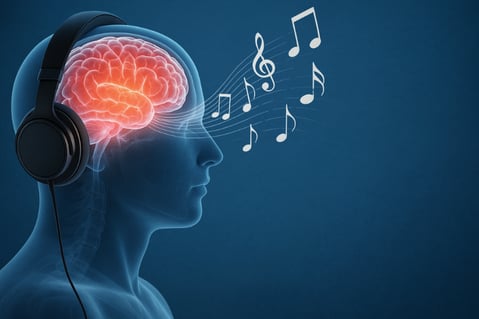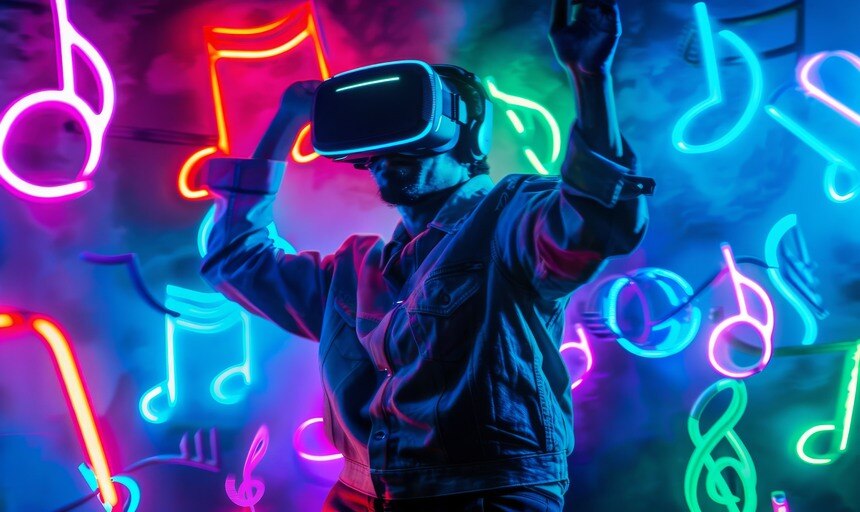
As AI and digital health platforms adopt music as a therapeutic tool, getting caught up in data and delivery is easy. But music’s true impact has always been its emotional resonance. In the race to build smarter systems, we can’t afford to lose sight of the very thing that makes music matter—how it makes people feel. This blog explores why emotion must be considered a core function, not a bonus feature, in music-based interventions. It looks at how emotional connection drives real-world outcomes in settings like dementia care and anxiety treatment, and why balancing clinical safety with human feeling is essential to building truly effective therapeutic experiences.
In a world obsessed with optimisation, are we forgetting what music is for?
We’re in the middle of a boom era for health-tech innovation. AI is tailoring treatments. Biometrics are guiding therapies. Algorithms are fine-tuning interventions in real time. And music, once an ambient afterthought, is now being trialled, measured, and dispensed in ways that mirror pharmaceuticals.
But amid all this precision and protocol, it’s worth pausing to ask: Where does the feeling go?
Music is, at its core, emotional. It evokes memories, shifts moods, unlocks meaning. And while the clinical frameworks around digital therapeutics are necessary, especially for credibility and regulation, we shouldn’t lose sight of the fact that music works because of what it makes us feel, not just how it scores on a chart.
What makes music work can’t be fully measured
Music engages multiple areas of the brain. The amygdala processes emotions in music, while the hippocampus links music to memory, a crucial aspect in dementia care. Harmony and tone are processed by the auditory cortex, and rhythm and tempo activate the motor cortex. The brain's base responds to the overall impact of music. These same brain regions govern other bodily functions, explaining music's therapeutic potential through their stimulation.
The brain responds to music more than any other stimulus. Initially, it was challenging to recognise that music is not just art but a combination of six sciences: math, physics, sociology, psychology, neurology, and physiology. These sciences combine to involve the process of listening to and processing music. Throughout history, great thinkers like Confucius, Plato, Tolstoy, Martin Luther King, and Einstein have all extolled the benefits of music to health. Despite common misconceptions, the science is solid, with 40 years of research and 25,000 papers on PubMed supporting the bioscience of music's effects.
The emerging field of music-based therapeutics is increasingly validated by data. NHS trials, like those run by MediMusic, have shown up to 25% improvements in heart rate variability, a marker for reduced anxiety. Other studies have shown significant drops in cortisol and improvements in subjective well-being.
And yet, often it’s not the biometric shift that makes the biggest difference: it’s the emotional connection. A dementia patient hears a familiar song shared with loved ones. A teenager with anxiety finds calm through immersive ambient sound. These aren’t just data points. They’re deeply personal, often transformative moments.
 “That emotional acceptance, combined with physiological impact, is incredibly rare in medicine.”
“That emotional acceptance, combined with physiological impact, is incredibly rare in medicine.”
— Gary Jones, CEO, MediMusic.
Emotion isn’t opposed to data — it complements it
Let’s be clear: we need algorithms. AI is essential for personalisation at scale. It’s what makes it possible to deliver the right music at the right time, especially in fast-moving healthcare environments.
 As Con Raso, Managing Director of Tuned Global, points out, "It’s not about removing the emotion from music — it’s about harnessing it in a clinically meaningful way.”
As Con Raso, Managing Director of Tuned Global, points out, "It’s not about removing the emotion from music — it’s about harnessing it in a clinically meaningful way.”
That’s what companies like Tuned Global enable behind the scenes: the infrastructure that allows this music to be segmented and then be securely delivered and legally cleared. But even the smartest system needs to be built with the patient's emotional experience at the forefront. That’s the edge. That’s what makes the difference between background noise and genuine care.
Clinical safety can’t mean emotional neutrality
Carefully balancing safety and sterility is a key challenge in therapeutic music use. While it's important to avoid triggering content, such as aggressive lyrics in trauma therapy, music with emotional resonance can be beneficial. For instance, familiar, hit songs from dementia patients' youth can trigger positive memories and lucidity in dementia patients. Conversely, overly melancholic themes should be used cautiously in mood disorder contexts.
But strip out too much, and you risk losing the emotional texture that makes music powerful. Clinical medicine doesn’t have to mean clinical in tone.
That’s why catalogue curation is so important. And it’s not just about what you remove; it’s about what you reveal. Music that connects culturally, generationally, and even spiritually. Music that feels right.

The competitive advantage is emotional intelligence
We often talk about engagement metrics in healthcare: time spent, adherence, and satisfaction. But in music-based interventions, emotional resonance is one of the biggest drivers of success. When someone feels understood, they trust the system. When they trust it, they use it more. And when they use it more, the results follow.
In other words, emotion isn’t a soft feature. It’s a core function.
That’s why developers, curators, and clinical designers must build together. Not just to deliver a working product, but to deliver a meaningful one.
Conclusion: emotion and data can coexist
Music in MedTech isn’t just a science. It’s still very much an art. And the best results will come when we better understand both using data to guide and emotion to connect.
The future of digital therapeutics won’t just be more intelligent. It will be more intuitive, more inclusive, and more emotionally attuned. And when it comes to music, that’s not a compromise. That’s the point.
Further reading:
- Music interventions and emotion in dementia care (NIH)
- Music’s impact on anxiety and physiological regulation
- Personalised sound and mental health outcomes
Ready to bring emotion back into digital therapeutics?
Whether you're building a music therapy app, exploring AI-powered MedTech, or curating a music catalogue for clinical use, now’s the time to design with data and emotion in mind.
At Tuned Global, we help healthcare innovators, developers, and rights holders deliver compliant, personalised, and emotionally resonant music experiences at scale.
Explore how Tuned Global can support your music and MedTech integration. Let’s create something that doesn’t just work — it connects.
Contact us to get started.




